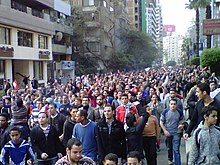
Waithood (a portmanteau of "wait" and "adulthood") is a period of stagnation in the lives of young unemployed college graduates in various industrializing and developing nations or regions, primarily in the Middle East, North Africa (MENA) and India, where their expertise is still not widely needed or applicable.[1][2] "Waithood" is described as "a kind of prolonged adolescence",[3] and "the bewildering time in which large proportions of youth spend their best years waiting". It is a phase in which the difficulties youth face in each of these interrelated spheres of life result in a debilitating state of helplessness and dependency. One commentator argues that waithood can be best understood by examining outcomes and linkages across five different sectors: education, employment, housing, credit, and marriage.[4]
The neologism was coined in 2007 by political scientist Diane Singerman.[5][6]
Waithood is applicable only to college educated people who are not compelled to settle in blue collar jobs due to support from family elders or resources. Due to the lack of any potential employment, waithood is also tangentially related to rising rate of belated parenthood in various developing countries, with younger people choosing or being forced to delay starting their own families, which was uncommon in the modern industrialized countries when they were developing.[7][8]
- ^ Cuzzocrea, Valentina (2019-05-01). "Moratorium or waithood? Forms of time-taking and the changing shape of youth". Time & Society. 28 (2): 567–586. doi:10.1177/0961463X18763680. hdl:11584/237022. ISSN 0961-463X. S2CID 149870672.
- ^ Honwana, Alcinda (20 February 2014). "'Waithood': Youth Transitions and Social Change". In Foeken, Dick; Dietz, Ton; de Haan, Leo; Johnson, Linda (eds.). Development and equity: an interdisciplinary exploration by ten scholars from Africa, Asia and Latin America. Leiden: Brill. pp. 28–40. doi:10.1163/9789004269729_004. ISBN 978-90-04-26790-9. Note: This book is a collection of papers presented at the Lustrum Conference in honor of Price Claus, held in Paleis Noordeinde in The Hague on 28 November 2012.
- ^ Singerman, Diane (20 February 2008). "Thirty and Single, Coping with Delayed Marriage". Washington, DC: Middle East Youth Initiative. Archived from the original on 2008-07-05.
- ^ Dhillon, Navtej (22 May 2008), Middle East Youth Bulge: Challenge or Opportunity?, Washington, DC: The Brookings Institution, archived from the original on 2011-06-06
- ^ Inhorn, Marcia C.; Smith-Hefner, Nancy J. (9 December 2020). Waithood: Gender, Education, and Global Delays in Marriage and Childbearing. Berghahn Books. p. 171. ISBN 978-1-78920-900-6.
- ^ Singerman, Diane (September 2007), The economic imperatives of marriage: Emerging practices and identities among youth in the middle east, Middle East Youth Initiative Working Paper, vol. 6, Washington, DC: Middle East Youth Initiative, doi:10.2139/ssrn.1087433, SSRN 1087433
- ^ Middle East Youth Initiative. "Understanding Waithood". Washington, DC: Author. Archived from the original on 2008-08-20.
- ^ Silver, Hilary (September 2007), Social Exclusion: Comparative Analysis of Europe and Middle East Youth (PDF), Middle East Youth Initiative Working Paper, vol. 1, Washington, DC: Middle East Youth Initiative, archived from the original (PDF) on 6 March 2008